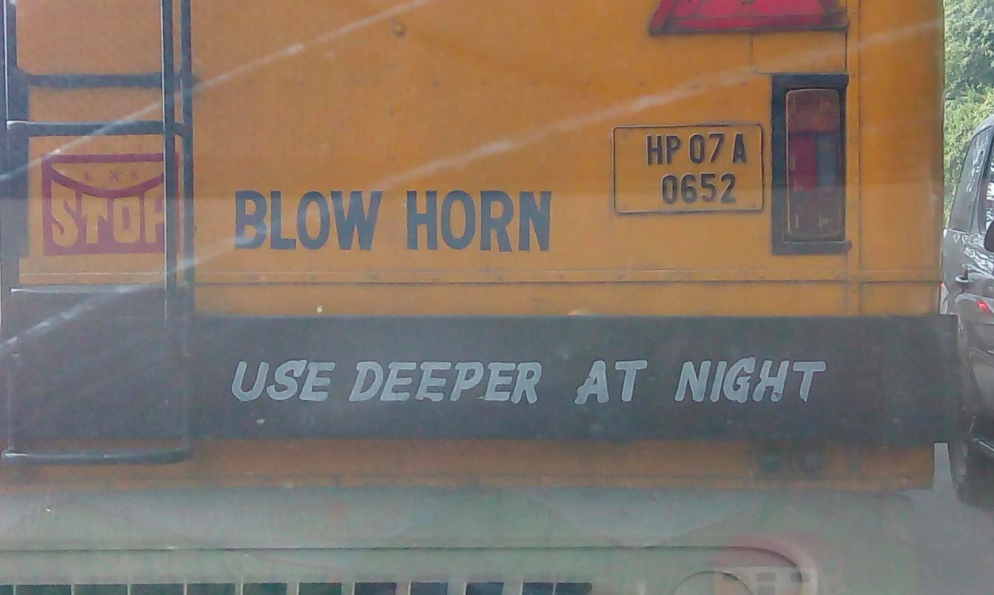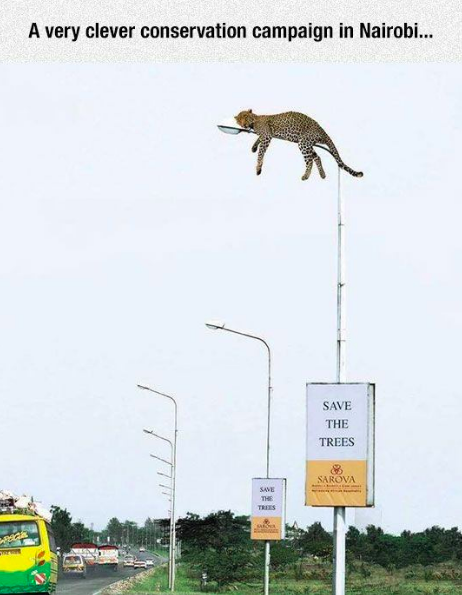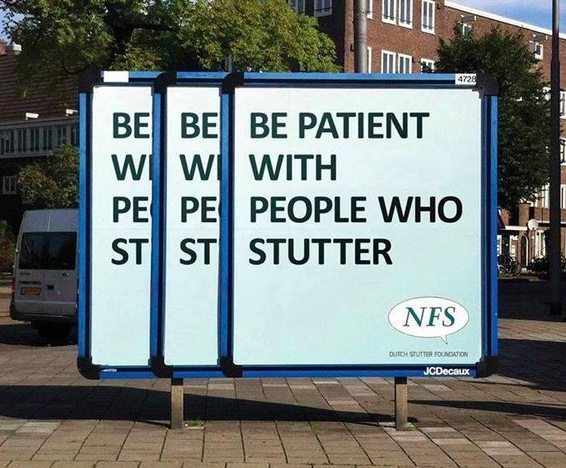In today’s world which puts such a premium on communication we have millions of words and sound bytes thrown at us every day. I read somewhere that the equivalent of one whole Encyclopedia Britannia is uploaded on the net every TWO MINUTES ! To protect our sanity from an overload the brain automatically filters out 99.99% of the stuff. Unfortunately, one of the genres filtered out is also one of the most innovative, unconventional and creative ones: I refer to the signboards and hoardings on the roads and the stickers or painted words of wisdom on the back of trucks, buses and autos. This is not the elite blather of Ogilvy and Mather or Hindustan Thompson, this emanates from a grass roots sub-culture of those who live their lives on the roads and in public spaces, one way or the other. It is therefore far more virile, spontaneous and infused with an earthy humour that reflects the pulse of life of the sons of toil. Most of us not yet confined to hospital beds spend a large part of our lives on the roads, yet how many of these signs can we recollect ? Be honest.
I have been fascinated by this highway literature for some time now and have noted a few of them: this is as good a time as any to share them with the reader who must by now be sick of the full-page ads of both the Aam Aadmi and Samajwadi parties and badly in need of a break !
Many years ago I was driving to the Corbett National Park when at a roadside dhaba-cum-liquor shop I saw a sign announcing CHILD BEAR. I couldn’t believe my eyes- this was a wild life sighting I never expected. I parked quickly and rushed inside. There was no bear cub there, the owner assured me, only CHILLED BEER ! Was it the Uttarakhand education system on display here or a wily marketing strategy ?
Continuing on to the Dhekala Rest House within the Park, adjacent to which flows the Ramganga river, we witnessed a rare instance of bureaucratic humour. On the bank of the stream( which is infested with crocodiles) was a signboard containing a dire threat:
RIVER HAS CROCODILES. SWIMMING PROHIBITED. SURVIVORS WILL BE PROSECUTED
Quite a Hobson’s choice, if you ask me– if the crocks don’t get you, the cops will !
We are all used to painted advice on the rear of trucks and buses, exhorting us to use the horn or dipper or to stay away from power brakes. But what on earth does one make of this, sent to me by a friend recently ? Its a sign painted on the rear of a Himachal University bus : USE DEEPER AT NIGHT. I sometimes wonder if the guy who painted this was an illiterate, a closet humourist or a sexual deviant. I am giving the photo below as proof that this is not an invention. HP University is an educational institution, right? Then how come no one there has noticed this bad spelling. worse pun (or therapeutic advice)

There was a time when auto rickshaw drivers in Delhi didn’t just beat up passengers, they made them smile. In the early 90’s I was serving my five year sentence in the Ministry of Coal in Shastri Bhavan ( before they started handing out longer prison sentences in this Ministry). The Ministry had hired an auto rickshaw for delivering files to the officers’ residences. On the back the driver had inscribed:
NANAK DUKHIYA SAB SANSAR, SARE DUKHIYA YAMUNA PAAR.
Amen. I live in ” Yamuna Paar” these days and I know exactly what he meant.
Not too long ago Himachal still had avian life in the wild, but that was before our politicians discovered there was much more money to be made from hydel projects, cement plants and road widening projects. One day, driving down to Kalka, I was pleasantly surprised to note that some enterprising forester had put up a board on the roadside near a clutch of dhabas, claiming that
A BIRD IN THE BUSH IS WORTH TWO ON A PLATE.
The sign is no longer there. Its a pity, because there is certainly a need for the HP Forest Deptt. to continue trying to educate the public on similar conservation issues. I sometimes wonder what we’ll be seeing in a few years ?
Maybe something like this: THE WESTERN TRAGOPAN IS OUR STATE BIRD ( UNFORTUNATELY IT IS NOW EXTINCT).
Here is another message on conservation from Kenya- without a single word needed to be spoken:

Truly, a picture is worth a thousand words.
Governments are not known for their sensitivity to the disabled or the disadvantaged. That is why I found this hoarding on a road in the Netherlands quite touching. It is absolutely brilliant in conveying the ” feel” of this particular handicap. Maybe our own governments should emulate such empathy, instead of merely making meaningless gestures such as changing ” viklang” to ” divyang” and then ensuring that they have no access to public spaces, trains or buses and are regularly humiliated at air-port security and on planes.

Finally, I cannot conclude without referring to a remarkable advertisement issued by the Punjab govt. in the early 1980’s. In a bid to woo industrialists the government, quite against the run of play, came up with a bright idea and announced it in all newspapers as follows:
GOOD NEWS FOR INDUSTRIALISTS. ALL THEIR NEEDS WOULD NOW BE TAKEN CARE OF BY ONE SINGLE WIDOW !
Talk of window of opportunity! Never has one missing alphabet contributed so much to the industrialisation of a state.
| The author retired from the IAS in December 2010. A keen environmentalist and trekker he has published a book on high altitude trekking in the Himachal Himalayas: THE TRAILS LESS TRAVELLED.
His second book- SPECTRE OF CHOOR DHAR is a collection of short stories based in Himachal and was published in July 2019. His third book was released in August 2020: POLYTICKS, DEMOCKRAZY AND MUMBO JUMBO is a compilation of satirical and humorous articles on the state of our nation. His fourth book was published on 6th July 2021. Titled INDIA: THE WASTED YEARS , the book is a chronicle of missed opportunities in the last nine years. Shukla’s fifth book – THE DEPUTY COMMISSIONER’S DOG AND OTHER COLLEAGUES- was released on 12th September 2023. It portrays the lighter side of life in the IAS and in Himachal. He writes for various publications and websites on the environment, governance and social issues. He divides his time between Delhi and his cottage in a small village above Shimla. He blogs at http://avayshukla.blogspot.in/ |




On an separate email thread Dileep Srivastava wrote about this blog post:
Here are some signs noted when we visited Ladakh in Jul’15
– Speed is a vice that cuts life
– Think before you pollute
– Help us keep Chanthang litter-free
– No mobiles while driving
– Be alert accident hurts
– Concern for others is rule of the road
– East or West, safe driving is the best
– I brake for tailgaters
– Drive slowly
– This is highway not a runway, drive slowly
– Be gentle on my curves
– Border roads in the service of the nation
– Driving risky after Whisky
– A spill a slip, a hospital trip
– Don’t tease wild animals, don’t feed wild animals
– No stop zone
– Speed and safety never meets
– Conserve wildlife
– All will wait, better be late
– Blow horn on curves
– Think clean
– Survival of man depends on survival of plants and animals
Best is HP University bus where the script was given by prof……..